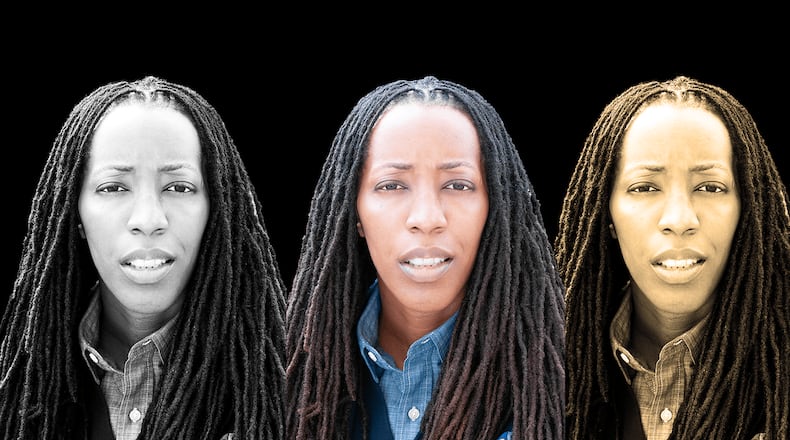A recruited athlete at a Southern college from an inner-city high school in New York state, Bettina Love discovered her teammates from middle-class families were not enrolled in any of her classes. While they studied biology, physics and journalism and dreamed of becoming doctors and broadcasters, Love was registered for outdoor recreation and first aid classes as part of a degree in recreation and leisure.
When Love consulted her adviser about switching to an education major, his advice was succinct and brutal: “You are here to play basketball.”
Love recoiled at this cynical assessment of her potential and followed the advice of her equally outraged athletic director from her high school and transferred. That decision ultimately led Love, now 44, to a doctorate in education from Georgia State University and a career as a scholar at the University of Georgia and now at Teachers College, Columbia University.
Love co-founded the Abolitionist Teaching Network, which develops and supports teachers and parents fighting injustice within their schools and communities, and wrote several books, including one due out today, “Punished for Dreaming: How School Reform Harms Black Children and How We Heal.”
Credit: Contributed
Credit: Contributed
In an interview from her Atlanta home where she still lives — she commutes to Manhattan — Love said her new book grew out of her own experiences and those of Black peers whom she describes as the post-Civil Rights Movement and hip-hop generation. They were supposed to benefit and build on the civil rights gains that their parents and grandparents won through sweat, blood and sacrifice.
Instead, Love contends the war on drugs became a war on Black people and schools became battlefields. “They put cops in our schools and targets on our backs,” said Love.
The 1980s and 1990s saw the embrace of zero tolerance, school police and metal detectors, No Child Left Behind and “no excuses” policies, said Love. Struggling students were not met with opportunities, compassion and understanding, she contends, but with low expectations, physical violence, surveillance and frequent suspensions.
A former Atlanta student Love interviewed for her book estimates that he was suspended between 120 and 140 days from kindergarten through high school. That he became a successful accountant occurred despite his education, not as a result of it, he told Love.
“In the ethos in the 1980s, we saw children as super predators, crack babies and thugs. We said they didn’t deserve to be in school. We became comfortable disposing of children. We became comfortable with not seeing children as children anymore,” said Love.
Love proposes educational reparations for school reforms that punished students for being Black and young. With the input of economists, Love argues reforms that led to the over jailing and under educating of Black children warrant $2 trillion in reparations from their lost intellectual, creative and entrepreneurial potential. Along with reparations that she wants overseen by the federal government, Love calls for atonement, apology and systematic changes that recognize every child as deserving.
In the aftermath of the pandemic, schools complain kids lack discipline. “We say these students are out of control. But many of these students are depressed. What you are seeing is what happens when you leave someone undiagnosed for such a long period of time,” said Love.
Increasingly, studies have found disruptive behaviors in children and teens may be post-traumatic stress or depression. Schools have to look at students who appear out of control and address their mental health needs, said Love.
She also believes the “public schools in chaos” theme is a political ploy. “We can’t sit here and see public education gutted right before our eyes by those who want to privatize it. They are doing it by creating chaos, by making society believe this public good is no longer serving the public, that it is out of control.”
Love cites the current campaign to whitewash Black history in schools and ban any mention of diversity, equity and inclusion policies. “At the end of the day, Black history is American history. All children, regardless of ethnicity or race, should learn this history. It doesn’t do any good when white children don’t know the contributions and beauty of Black people and what Black people have done for society. People believe Black folks are takers — well, that is because we haven’t educated them about this.”
Teachers resisting the coercion to sanitize Black history and relegate LGBTQ students to the shadows must be protected, said Love, maintaining it has to fall to federal legislation to combat book bans and teacher persecutions.
“Teachers are leaving their jobs because they are tired of being used as political punching bags,” she said. “They are asking: ‘Do I want to be in debt and make $45,000 a year to be paraded around someday as someone who is indoctrinating children?’ ”
The students speaking out against all the new regressive policies hearten Love. “It is easy to get discouraged. Then, I stop and breathe and look at what young people are doing. When I was 14 or 15, I didn’t have words like anxiety. We said your nerves were bad. We didn’t have language about toxic masculinity. We didn’t talk about gender identity. We are watching young people brilliantly transform our society.”
Still, Love said, “I always cringe when people say the youth will get it right because that is a lot to put on 17-year-old kids — to do what we couldn’t do. I hope each generation does its part to make this country more just. But if you want kids to be the change, at least give them the tools for civic engagement.”
About the Author
The Latest
Featured



